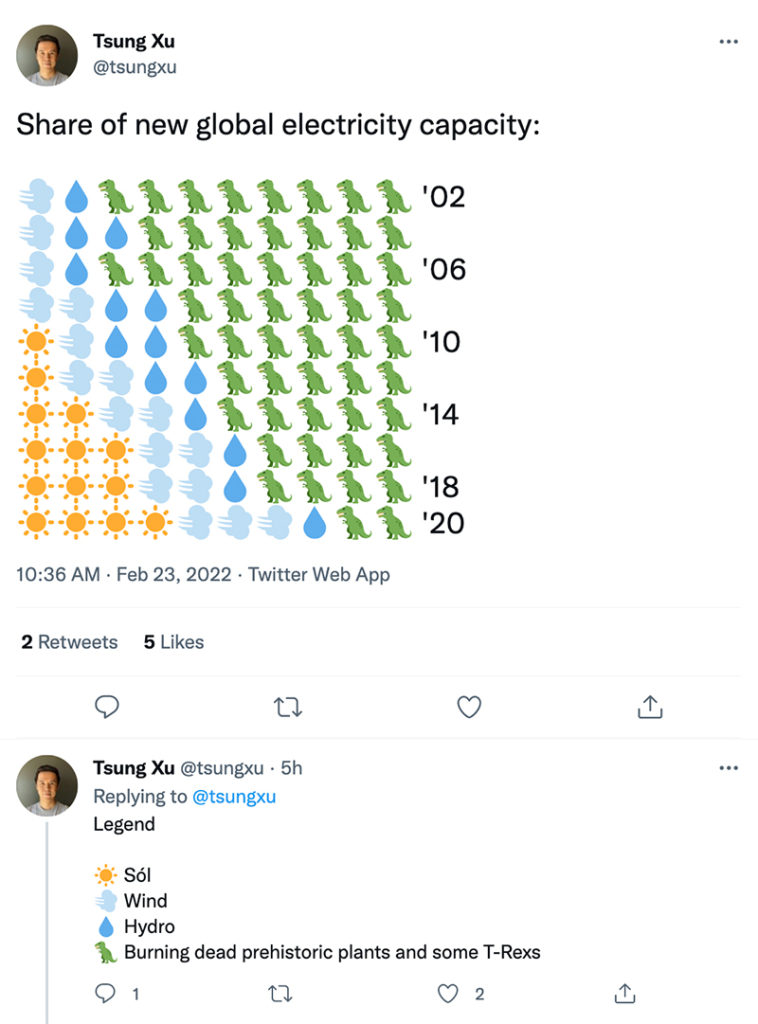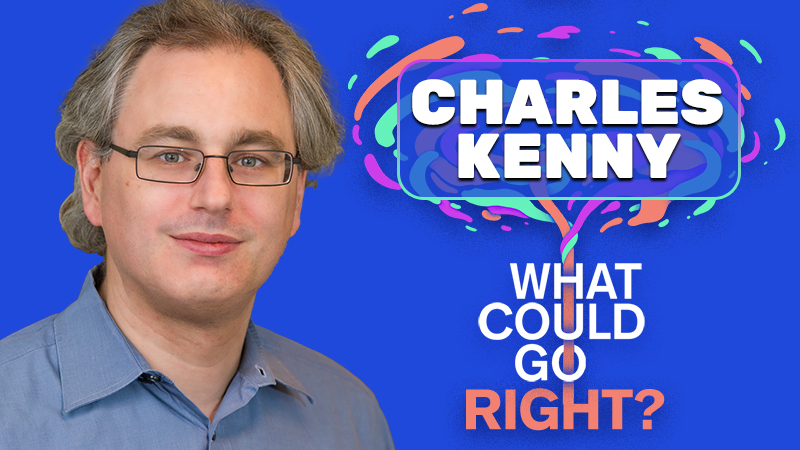Volcanoes are erupting in The Philippines, but on-fire Australia received some welcome rain. The Iran war cries have been called off and The Donald’s military powers are about to be hamstrung by the Senate. Meanwhile, his impeachment trial is starting, and we’re all on Twitter for a front-row seat.
What Could Go Right? No fourth dose needed for years
Plus, mobile mRNA vaccine hubs are heading to Africa; the relationship between outlook, action, and outcome; and more
This is our weekly newsletter, What Could Go Right? Sign up here to receive it in your inbox every Thursday at 6am ET. You can read past issues here.
War in Ukraine
The newsletter team, based in Asia and Europe, woke up this morning to the news that Russia has invaded Ukraine. The Progress Network (TPN) Member Ian Bremmer has a summary and macro-analysis here. He calls it a “turning point in the global order.”
We were moved by a translation of Ukrainian President Volodymyr Zelensky’s speech, given in today’s early hours, which you can find here. Parts of it were delivered in Russian, addressed directly to Russian citizens. “Lots of you have relatives in Ukraine, you studied in Ukrainian universities, you have Ukrainian friends,” he said. “You know our character, our principles, what matters to us. Listen to yourselves, to the voice of reason. The people of Ukraine want peace.”
The newsletter we had prepped before this situation emerged is below.
More mRNA in Africa, and no fourth dose needed
Recently a South African biotech company brought mRNA to the African continent for the first time by developing their own vaccine using publicly available data from Moderna. Now Rwanda or Senegal, or possibly both, are set to receive mobile mRNA vaccination production units—zhuzhed up shipping containers—from BioNTech. We’re inching a little closer toward worldwide access to mRNA technology.
“Making the vaccine involves some 50,000 steps that have to be followed meticulously. But the containers overcome this challenge by having ‘the process pre-validated’ before they are installed,” explains Africanews.

The units are expected to ship and be set up by mid-2022, and its first doses available a year from now, which is much faster than the three years it usually takes to open a standard vaccine production facility. The units could also produce mRNA malaria vaccines, if one proves to be a successful candidate.
Complete independence and/or patent sharing would be best for Africa and the globe, but still, the more mRNA vaccines are available, the better.
When the Israelis started with fourth doses for its older adults in January, we confess that we started to wonder whether we’d be getting jabbed every six months for the rest of our lives. Survey says: probably not. A “flurry of new studies,” writes The New York Times’ Apoorva Mandavilli, suggest that two or three doses, if you’re under 65, are enough to ward off serious illness and death for many years. And catch a load of this:
The Omicron variant can dodge antibodies—immune molecules that prevent the virus from infecting cells—produced after two doses of a Covid vaccine. But a third shot of the mRNA vaccines made by Pfizer-BioNTech or by Moderna prompts the body to make a much wider variety of antibodies, which would be difficult for any variant of the virus to evade, according to the most recent study, posted online on Tuesday [eds: February 15].
The diverse repertoire of antibodies produced should be able to protect people from new variants, even those that differ significantly from the original version of the virus, the study suggests.
If that finding holds, that would be excellent. The whole project of keeping the world fully vaccinated, especially as new variants appear, suddenly seems a lot easier.
What’s the point of an upbeat view?
This week someone on Twitter wrote the following to us: “All of these upbeat views are great, but it doesn’t [sic] stop wars, hunger, pain, and suffering. I wish it did.”
The word “upbeat” is a particularly trivializing one. Still, the thought behind the Tweet—that there’s no relationship between outlook, action, and outcome—is a common refrain we hear, and one we’re trying to uproot.
This week several of our Members posted tributes to Dr. Paul Farmer, who “basically invented the conversation about how to address global health inequality,” as geopolitical analyst R. P. Eddy wrote. Farmer’s life work was to correct that imbalance, which he did through several initiatives, like the sharing of cutting-edge HIV treatments with patients in countries usually last on the list to receive them.
“Paul believed that you can bring best care to anybody by giving to the poor and underserved,” Dr. Victor Dzau of the National Academy of Medicine told NPR. “There are a lot of people who thought it could not be done.”
Individuals like Farmer make it simple to see how outlook in fact has a profound effect on action and outcome. What happens when we listen to the people who believe hard things cannot be done and what happens when we listen to those who believe that even hard things are fixable are two drastically different realities.
The amazing thing about the world we live in now is that we have the knowledge and resources at our disposal to improve many of life’s worst circumstances. That hard things are fixable is not just a philosophical choice, but a fact-based reality.
Consider the example Bill & Melinda Gates Foundation’s polio director Michael Galway wrote about last week, on how close Pakistan is to being polio-free—modeling suggests it will happen in the next 18 months. How did Pakistan get to this point? In part by seeing and copying the success of other countries like Nigeria. Galway writes of Dr. Shahzad Baig, the national coordinator of Pakistan’s polio program, who was part of the Nigerian team when Nigeria was declared polio-free. “I remember how deeply I wished then that one day my own country would also eliminate the virus,” he told Galway.
One does not find the energy to act on such a wish without first believing that the possibility of it coming true, however slim, exists. The publishing of “upbeat views,” then, goes far beyond psychological comfort. It is meant to raise—and one day maybe answer—the question of what it would look like if an outlook of constructive possibility, the outlook that people like Farmer, Galway, and Baig share, was adopted en masse.
What would the outcome of a society with that outlook at its heart be? How many people would go HIV-undetectable or never contract it in the first place? How many children would grow up untouched by polio? What improvements not yet tried or even imagined could be produced? This is the point of an upbeat view.
Secure the bag—for you and others, too
Put this on the shelf along with the other dire reports about the pandemic that didn’t come true (although, of course, there were plenty that did). Despite predictions of the opposite, philanthropic giving by individuals, bequests, foundations, and corporations hit a record-high of $471.44 billion in 2020. When faced with financial uncertainty, and helped along by some hefty government-giving, we didn’t close our personal purse strings but opened them. “On top of gifts to traditional nonprofits, there was a noticeable surge in direct money transfers, as people gave digital cash gifts to struggling kin, friends, neighbors and small businesses,” says The New York Times.
So you want to be a millionaire? Maybe forget crypto and stick to your 401k. Fidelity Investments reported that its numbers of IRA and 401k millionaires—normal folks with normal jobs clocking in nine to five for decades—just hit an all-time high.
Before we go
Colombia is the third country in Latin America to decriminalize abortion. Abortion in cases of rape and danger to the mother’s life have been allowed since 2006; now elective abortion is allowed through 24 weeks.
On Tuesday, soccer players on the United States women’s national team reached a huge settlement with their employer, the US Soccer Federation: $24 million in back pay, but more importantly, a commitment from the organization that the men’s and women’s teams will be paid equally going forward.
And, The New Yorker did what The New Yorker does best, which is a human-centric deep dive into the pig-to-human heart transplant story, which we covered here. It includes what we’d like to put up for consideration as Quote of the Year. It’s from the surgeon who performed the operation, about his surprise and happiness when the pig heart got “hooked up” to the patient and first started working: “Hearts don’t just squeeze when they beat, they kind of twist, and this heart—it was doing the hoochy-coochy,” he said. Put this one on your list of weekend reading for sure.
Below in the links section, Tanzania unveils Africa’s first non-invasive Covid test; horseshoe crabs, bulls, and manatees get a helping hand; and more.

☝️Chart based on data from the International Renewable Energy Agency (IRENA), an organization that supports countries in their transition (from burning dinosaurs and whatnot) to sustainable energy.
Bonus Podcast Episode: The Plague Cycle

It might seem counterintuitive to ask in the middle of the Covid-19 pandemic, but is humanity winning the fight against infectious disease? Charles Kenny, senior fellow at the Center for Global Development, says we are. But we must continue availing ourselves of the solutions that have led to this progress if that answer is to stay. This conversation was recorded on January 19th, 2021. | Listen to the episode
Progress, Please
(Found good news? Tweet at us @progressntwrk or email.)
Other good stuff in the news
United States:
- The Oregon House passed a bill expanding online voter registration | KDRV
- The practice of draining horseshoe crabs for the immune cells in their blood may soon end, thanks to a new alternative | Freethink
- We can now use CRISPR to fight tick-borne diseases | Freethink
- An initiative in Philly is bringing mental health care into schools | The Philadelphia Citizen
- More LGBTQ couples can access Social Security survivor benefits | The Washington Post
- Construction has begun on New York’s first offshore wind farm | The Verge
- A Florida plan to save manatees is working—thanks to 25 tons of lettuce | NBC News
- The New Mexico House unanimously passed a bill to increase pay for Indigenous language teachers | The Hill
- Opinion: More places should do what Alaska did to its elections, adopt ranked-choice voting | The New York Times
International:
- Egypt’s patriarchy says women don’t ride bikes. These women disagree | African Arguments
- The possibility of universal organs for transplants has been raised | STAT
- Google is phasing out cross-app ad tracking on Android devices | Axios
- Kenya will use solar panels to boost crops by ‘harvesting the sun twice’ | The Guardian
- Why this could be a critical year for electric cars | The New York Times
- Sunlight can help clean up oil spills in the ocean | The Hill
- Benin is celebrating the return of its looted treasure | The Guardian
- Tanzania has a new non-invasive method to detect Covid-19 | Africanews
- Study: Which messages won over Covid-19 vaccine skeptics? | Vox
- Sinaloa became the fifth state in Mexico to ban bullfighting | Humane Society
- Australia’s largest coal-fired power plant will close in 2025, seven years early | The Guardian
- A look inside Uganda’s LGBTQ+ inclusive church | Minority Africa
- 75% of people worldwide want single-use plastics banned | Reuters
TPN Member originals ![]()
- Why is liberalism in decline? | David Brooks
- Awkwafina and the conflicts of assimilation | John Wood Jr.
- The keys to happiness, embracing weakness, and the importance of friendship | Arthur C. Brooks
- The seven habits that lead to happiness in old age | Arthur C. Brooks
- This is Putin’s war. But America and NATO aren’t innocent bystanders | Thomas L. Friedman
- America needs a talent strategy that includes the heartland | Richard Florida
- Why Biden didn’t negotiate seriously with Putin | Robert Wright
- The recent onslaught of book bans is a strategic part of wider attacks on our democracy | Suzanne Nossel
- The false narrative of elitism | Zachary Karabell
- The power and necessity of treating criminal defendants with dignity | Victoria Pratt
Meditate on our long list of the week’s progress links.
Upcoming Events
- What If We Could Build Journalism From Scratch? | David Bornstein and Tina Rosenberg | March 3
- Moral Foundations of Progress Studies | Jason Crawford, Steven Pinker, and David Deutsch | March 4–6
- Managing Happiness | Arthur C. Brooks | March 30
- Wharton Future of Work Conference | Adam Grant | April 7
- Breakthrough Dialogue 2022: Progress Problems | Ted Nordhaus | June 22–24
Until Next Time
We heard that if you choose yourself, you have to (get to?) start again. 🤔👇


